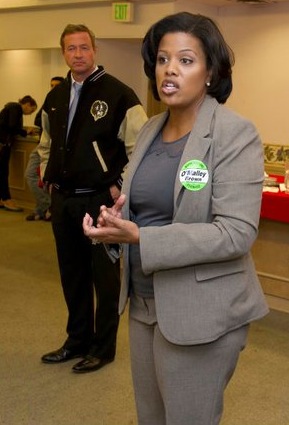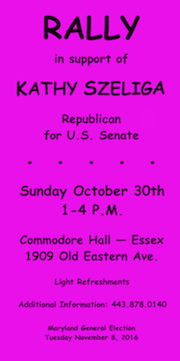
Gov. Martin O’Malley and Balto. Mayor Stephanie Rawlings-Blake got into a heated debate last year over zero-tolerance policing in Md.’s largest city.
DOES HE WANT MORE PEOPLE ARRESTED?
OR SHOULD MARIJUANA BE MADE LEGAL?
Collecting progressive cred like casino markers
A VOICE OF BALTIMORE EDITORIAL
By R.P.M. Kolchak
Make no mistake about it, Martin O’Malley likes putting people in prison.
He locked up hundreds of thousands of people as Mayor of Baltimore, and has advocated for even more arrests since taking up residence in Annapolis.
But his penchant for punishment has put the lock-’em-up gov in a dicey dilemma: What to do about a pesky little pot decriminalization bill that won’t go away and will soon show up on his desk for signing?
In an unusually bold maneuver last week the city’s black caucus forced the Maryland House of Delegates to bypass Judiciary Committee Chairman/strongman Joseph F. Vallario Jr. and pass a bill that would make possession of small amounts of pot the equivalent of a harsh parking ticket.
The maneuver was lauded as a much-needed reining-in in the war against drugs, a battle that has disproportionately taken a toll on African-Americans in the form of minor criminal records.
But the legislative victory has put O’Malley’s tough-on-crime cred into an uncomfortable crucible. In a sense, he’s being asked to tamp down on the very tactic he has long espoused.
During his tenure as Mayor of Baltimore the city arrested more than 600,000 people, thanks to the concept known as “zero tolerance.” It was a strategy O’Malley touted as the answer to a stubbornly high homicide rate which led to a torrent of incarceration, courtesy of a crackdown on minor crimes like drinking beer in public, and spitting on the sidewalk.
But the crime-crushing effect it was supposed to engender never materialized. And in an historic settlement of a lawsuit with the NAACP and ACLU, the city actually admitted that many of the arrests were illegal.
BAD PRESS AND LEGAL WRANGLING
But all the bad press and ugly legal wrangling made little impression on the presidential aspirant.
Witness his recent public sparring with Mayor Stephanie-Rawlings-Blake about ratcheting up the arrest rates during a particularly violent stretch in Baltimore last summer.
O’Malley upbraided the Mayor publicly for not responding to the crisis with more handcuffs.
The Mayor bristled, but the Governor was resolute: Lock-up more people.
Now.
So what can the tough-on-crime liberal do with a bill that drastically reduces the crime strategy that has defined his career?
Bear in mind that in 2013 the beleaguered Baltimore Police Department, that couldn’t solve half the murders on the books, still had time to arrest nearly 7,000 people for minor possession of pot.
SUPPORTERS SAY 92 PERCENT WERE BLACK
Worse yet, many of the marijuana bill’s supporters say, 92 percent of those were black.
Now, facing the prospect of eliminating an effective tool in the form of minor pot laws to keep turnstiles spinning at Central Booking, what will the Governor do?
Will he fasten himself like a stillborn barnacle to other hot-button liberal issues like gay marriage and wind power? Or will he stick to his tough-on-crime persona and let the thornier question of why we need a law that disproportionately affects minorities, twist in the wind?
Whichever O’Malley decides, it will likely cast the Governor’s hard hewn liberalism in an entirely different light.
Particularly if the man who collects progressive cred like casino markers turns his back on what could be the state’s first real chance in decades at a meager dose of social justice.
rpmkolchak@voiceofbaltimore.org
R.P.M. Kolchak is a sometime contributor to Voice of Baltimore.
EDITOR’S NOTE: On Monday, the last day of the 2014 legislative session, the Maryland General Assembly approved a bill to reduce the penalty for possessing small amounts of marijuana from 90 days in jail plus a $1,000 fine, to a civil penalty only, starting at $100. Despite previously fierce opposition, Governor O’Malley has said he will sign the bill.






April 10th, 2014 - 1:55 PM
Important facts. The claim that Zero Tolerance ended the crack epidemic in New York City is a myth (See The Rise And Fall of a Violent Crime Wave: Crack Cocaine And the Construction of a Social Crime Problem (Criminal… by Henry H. Brownstein (Jun 30, 1996).
The answer includes programs like Tots and Toddlers and Early Head Start. Also, most serious crime is committed by about ten percent of those arrested. Around 78% of those incarcerated get out and commit more crimes. Thus broadening the population of those arrested weakens the focus on serious crime. White collar criminals who cost society much more (See William Chambliss, From Petty Crooks to Presidents) are not a major focus of police or prosecutors. There is no system and there is damn little justice.
April 13th, 2014 - 10:53 AM
You are correct, zero tolerance did little to quell crime. It was an unfettered war on the poor that resulted massive civil rights violations. Baltimore’s version was particularly destructive and accounts for much of the decay we see in the city today